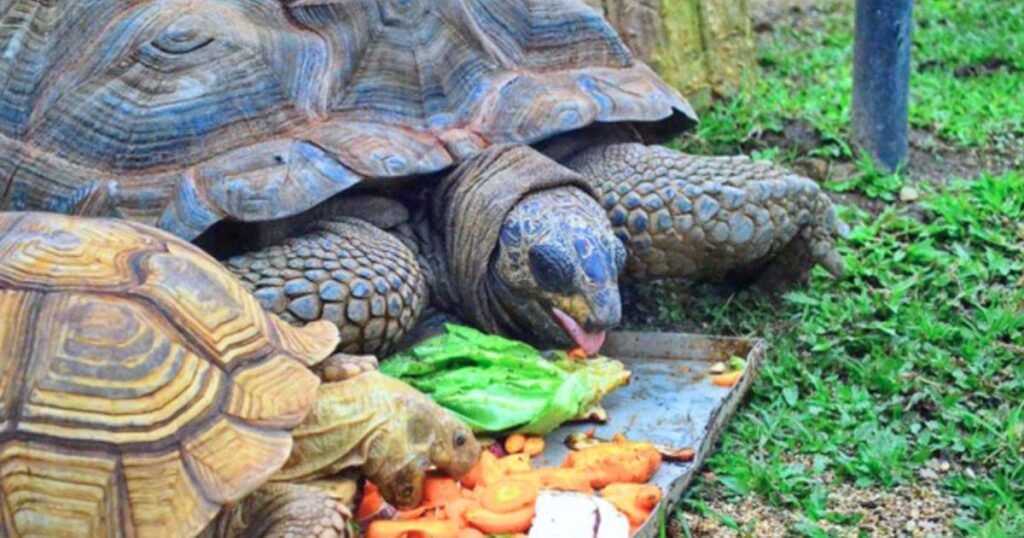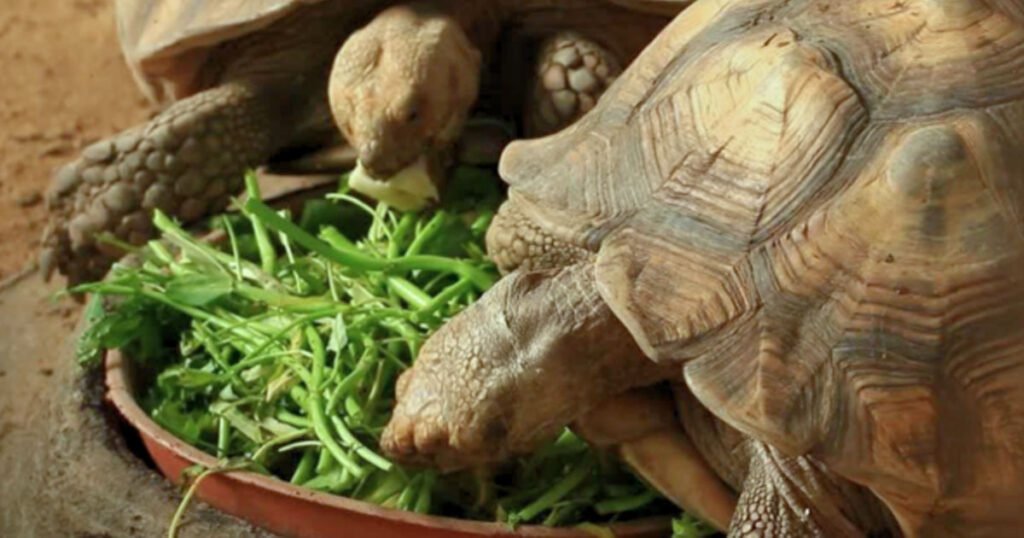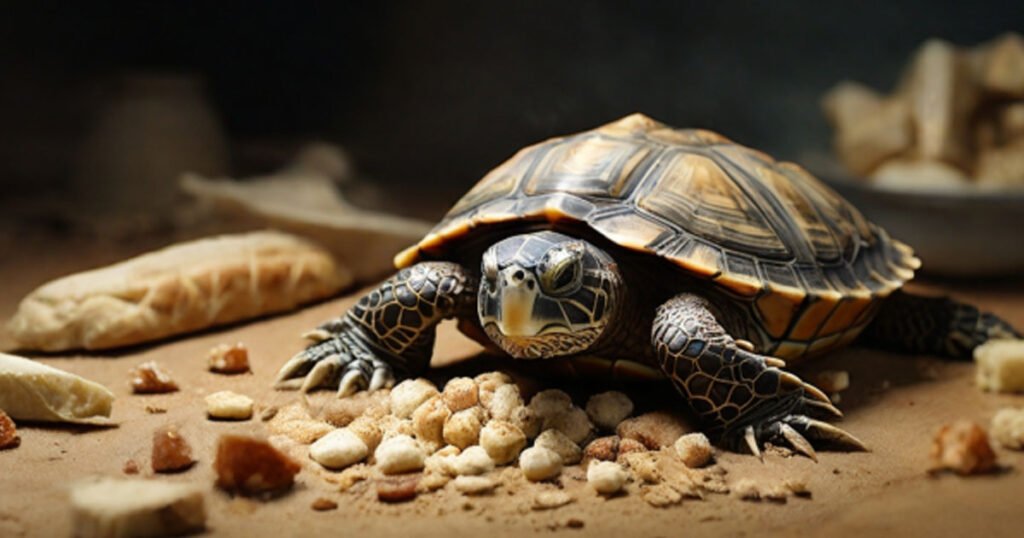Did you just get your first turtle pet or considering getting one? For beginner turtle owners a common question that comes into mind is “What human food do turtles eat?”. It is such an obvious curiosity; as the owner, you have to give your turtle the right food. While turtles have diverse dietary needs, it’s crucial to ensure their meals are safe and nutritious.
You may already know that turtles are omnivores. But each turtle’s food habit is not the same as it depends on several criteria like species, age, different habitat, etc. Some of the basic human foods you can give to your turtle are –
- Raw/cooked vegetable
- Different green plants
- Meat
- Fish
- Fruits (with moderation), etc.
That’s not all. You just can’t serve this food however you want. You have to know what food to give and how much. There are also a variety of lists of foods you can feed your turtles. So, let’s take a look at the human foods that you can give your pet turtle.
Table of Contents
Can Turtles Eat Human Food?

Yes, they can. Turtles are quite the foodies and can munch on a wide variety of human foods. Being omnivores, they’re not picky eaters and will happily chow down on veggies, meat, fish, and fruits. They’re like little culinary adventurers, always up for trying new treats.
However, not all human foods are turtle-friendly. While they may have an adventurous palate, some foods can be harmful to our shelled friends. So, while sharing your snacks with them can be fun, it’s essential to make sure you’re offering them safe and nutritious options.
What Human Food Do Turtles Eat?

There are many human food lists, which turtles prefer. Let’s have a look at them.
1. Vegetables & Greens
Healthy turtles do well on a diverse diet of vegetables. Vitamins and minerals in these green foods are vital to their health and well-being.
Leafy Greens: Collard greens, kale, and spinach are nutritious options for turtles. These greens provide vitamins and minerals necessary for shell development and overall health. However, spinach should be given in moderation due to its high oxalic acid content. Also, leafy greens like lettuce do not serve any significant nutrition to turtles.
Other Vegetables: Corn, cabbage, carrot, and okra are also suitable choices for turtles. These vegetables offer a mix of nutrients and fiber, contributing to the turtle’s balanced diet.
2. Fruits as Treats
Fruits are a tasty treat for turtles and provide vitamins and minerals. Apples, grapes, raspberries, mangoes, raisins, and melons are safe options for turtles. Remember to cut fruit into small, bite-sized pieces to prevent choking. Here are some fruits your turtle will love:
1. Apples: Rich in fiber and vitamins, apples are a crunchy and nutritious treat for turtles. Remove the seeds and core before feeding.
2. Grapes: Sweet and juicy, grapes are packed with hydration and essential nutrients like vitamin C. Slice grapes into smaller pieces to prevent choking hazards.
3. Raspberries: These tiny berries are bursting with antioxidants and fiber, promoting digestive health in turtles. Serve raspberries fresh and washed.
4. Mangos: Full of vitamins A and C, mangoes are a tropical delight for turtles. Peel and slice mangoes into small chunks for easy consumption.
5. Raisins: Natural and delicious, raisins deliver a sweet energy boost for turtles. Offer raisins sparingly due to their high sugar content.
6. Melons: Refreshing and hydrating, melons like watermelon and cantaloupe are perfect summer treats for turtles.
Remember: While fruits are a delightful addition to your turtle’s diet, moderation is crucial. Give your turtle a balanced diet of fruits to make sure it gets all the nutrients needs and leaves unhealthy agents.
3. Meat: A Key Part of the Turtle Diet
Turtles have a strong appetite for meat, particularly juveniles who favor this type of food. While meat benefits turtles, excessive consumption can lead to health issues.
Choosing the Right Meat: Fresh meat is a better choice for turtles than fatty cuts like bacon or steak, which can lead to health issues. While turtles can consume both cooked and raw meat, cooked meat is recommended to eliminate harmful bacteria.
Balancing the Diet: To maintain a healthy diet, it’s essential to provide a balanced mix of meat and other combinations. Keeping meat servings balanced is essential to preventing overconsumption of any food group.
The Dangers of Pyramiding: It’s important to eat meat for shell development, but too much can cause pyramiding. Pyramiding is a condition where the shell grows abnormally, forming pyramid-like shapes on its surface. Although reversible in its early stages, severe cases can permanently affect the turtle’s health.
4. Fish: A delicate balance
Turtles live with fish in their natural habitat means in water and readily consume them. However, not all fish are suitable for turtle consumption.
Consideration of Fat Content: Similar to meat, it’s crucial to avoid feeding turtles fish with a high-fat content. Turtles can develop health problems if they eat too much fat.
Bone Hazards: Fish with numerous bones should be avoided in turtle diets. Turtles cannot remove bones from fish, increasing their internal injury risk. However, in nature, they are used to choose what fish they can eat or not. But for pet turtles, you must remove fish bones.
The Dangers of Wild-Caught Fish: While turtles may get to eat fish in the wild, it’s best to refrain from offering wild-caught fish to pet turtles. These fish can have harmful bacteria that threaten turtle health.
Ensuring Safe Consumption: When selecting fish for turtles, look for varieties low in fat and free of bones. Additionally, consider sourcing fish from reliable suppliers to minimize the risk of bacterial contamination.
While fish can be a nutritious addition to a turtle’s diet, it’s essential to provide a balanced meal plan that includes a variety of food groups.
What Human Foods Should Turtles Avoid?

The following is a list of some foods turtles shouldn’t eat too often.
Bread and Bakery Treats/ Wheat Products: While turtles may gobble up bread and pastries, these goodies lack essential nutrients and may upset their stomachs.
Dairy Dilemma: Turtles can’t stomach dairy, so keep cheese and milk out of their diet to prevent tummy troubles.
Sweet Temptations: As much as turtles crave sweets, sugary treats can harm their health and should be off-limits.
Pasta/noodle Pitfalls: Pasta and noodles aren’t on the turtle’s menu for a healthy reason. It offers little nutritional value and can be hard to digest.
Snack Attack: Turtles should avoid chips, biscuits, and popcorn due to their unhealthy additives.
Avoid nuts: Although nuts seem wholesome, they contain oxalates that hinder calcium absorption in turtles, so it’s a no-go.
Egg-cellent or not?
While eggs can be a protein source, turtles should stick to boiled and peeled eggs to avoid potential health hazards.
However, all of the above should be avoided from turtles’ diet, but a small amount won’t hurt them.
Safe & Unsafe Fruits for Turtles
Turtles enjoy a variety of fruits, but some should be consumed in moderation due to their phosphorus content. Avoid citrus fruits as they can irritate turtle stomachs and cause vomiting.
Best fruits for Turtles: Safe fruits include apples, grapes, raspberries, and melons. These provide essential vitamins and minerals for a turtle’s diet.
Phosphorus-Rich Fruits Limit: Fruits like raisins, dates, bananas, and coconuts contain high phosphorus levels. While these can be fed occasionally, moderation is key.
What Fish are Safe and What Should be Avoided?
While turtles naturally eat fish, some species pose risks due to sharp bones. Avoid fish like goldfish, gizzard shad, red minnows, platies, carp, etc which can harm turtle internal organs.
You should watch thiamine levels in fish since too much can block turtles’ absorption of vitamin B1. Moderation is essential to prevent nutrient imbalances.
FAQs
What do turtles eat human food?
Turtles can eat some human foods, but not all. They enjoy veggies like lettuce and carrots, and also fruits like berries. Avoid giving them processed foods or sweets, as they can be harmful. Stick to a balanced diet of turtle food for their best health.
What human foods do turtles eat?
There are many human foods that turtles can consume safely such as – Vegetables, Leafy greens, Fruits, Raw or cooked meat, and fish. If you are a turtle pet owner you should have a basic knowledge of what human should be preferable and what not.
Read More: What Does Gopher Turtles Eat
Bottom Line
In a nutshell, knowing what human food do turtles eat turtles eat is super important for their health. They like some of the same snacks we do, like fruits and veggies, but we have to watch out for junk food! Don’t give them too much-processed stuff, sugary treats, or greasy food.
Keep it fresh and healthy with leafy greens, tasty fruits, and lean meats to keep those little shelled buddies feeling awesome. When you think of sharing a snack with your turtle pal, keep it wholesome, keep it tasty.
